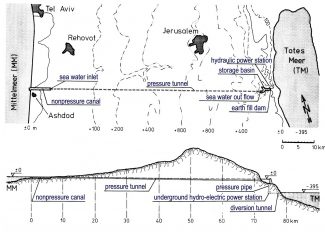Of all the myths that surround the Israeli-Arab conflict, the most prominent and cherished is that the inevitable solution is a two-state framework. At the height of the most recent round of hostilities between Hamas in Gaza and Israel, no less capable a student than CNN’s Farheed Zakaria proclaimed the two-state solution as end game once again on July 20.
This article argues that the continued proclamation of the two-state solution has become more of an article of faith and esoteric liberalism – impervious to extremism on the ground – than a probable outcome, or even a desirable one.
Far more probable are recurrent rounds of low-intensity conflict where Israel has the upper hand in military and strategic terms to retain land it either considers strategic imperative and/or God-given, but lacks global support for annexation, nor a democratic answer to the demographic prospect of a Palestinian majority. This mirrors the Palestinian position which is existential and absolutist as well. The relative moderation of Mahmoud Abbas and Fatah is often usurped by Islamic militant positions that do not accept Israel’s existence. In short, most Israelis view the two-state solution proposal as a tactical stage for the Arabs to launch their final push on an Israel deprived of strategic depth. A handful of Palestinian moderates speak of equal citizenship, but Hamas and others are quite transparent in their charters that Palestinian victory is achieved with the Jews in the Mediterranean.
Since a weakened Israel that faces a more imminent and existential threat is a regional recipe for a major pre-emption or reaction that could invoke the ‘Sampson Option,’ an imposed or premature two-state solution that evolves from anything less than direct bilateral negotiations with specific guarantees seems more dangerous than the status quo.
Given this stalemate, the approach of global powers and regional brokers needs to evolve more interest in stability and growth than in the imposition of a liberal solution that sounds fair (and what sounds fairer in ahistorical liberalism than for Dad to cut the disputed piece of pie in half to end a sibling quarrel?). The focus should be Israeli-Palestinian separation and the real day-to-day improvement in the lives of the Palestinians.
This short essay proposes – resurrects, in fact – a plan as old as the two-state approach, but which lost traction for reasons unclear.
This is not a “barrier” such as another wall or fence that invokes more mistrust and controversy, with charges of Apartheid. On the contrary, the proposal offers a rare win-win scenario for Israelis and Palestinians, and does not prejudice an end-state outcome inherent to the two-state solution.
The Med-Dead Canal, it is argued, is just the tonic to create “conflict barriers” between Israelis and Palestinians with a genuine prospect to improve the lives of Gaza Palestinians in a manner conducive with Israeli security interests.
The basic political and human premise is simple, (albeit the logistics, economics, environmental, and engineering aspects require more detailed analysis.)
First and foremost, a canal of sufficient width and depth is constructed between the Mediterranean just north of Gaza through to the Dead Sea, promising de-salinized fresh water for Gaza. If the grade and lock structure is favourable, the flow of water could also support the electrical grid in Gaza. If the grade is less suited for power, then it could instead support a managed seaport for Gaza, monitored by Israel and international partners to ensure goods received support the Palestinian people and economy, not rockets.
For Israel, the project is also a win. Power, fresh water, and a managed seaport for Gaza will relieve pressure from the international community and promote moderation inside Gaza.
More important from a conventional security perspective, a canal offers an efficient barrier to land infiltration by militants who would now be forced to consider vulnerable zodiac boats. Tunnel infiltration would almost be impossible on the northern border with Israel. Bridges, as required, offer more controlled checkpoints for access.
Israel, and Jordan, also benefit from the original goal of the Med-Dead concept to restore the waters of the Dead Sea, the southern portion of which is now cut-off from the northern waters, which continue to shrink.
Perhaps more fanciful but not impossible, Med-Dead could in fact facilitate Dead-Red, where a waterway is created from the Dead Sea on the Israeli-Jordanian border to the Red Sea juncture of Israel, Saudi Arabia, Jordan, and Egypt.
The Med-Dead dream need not remain just a dream. Such a project represents tangible economic, humanitarian, and security benefits for both Israelis and Palestinians and generates barriers to conflict.
If there is to be a meaningful truce in Gaza, as opposed to just a rest and re-arm period for the next round, then Med-Dead is just the tonic. More UN speeches, Ban Ki-Moon and Desmond Tutu and Roger Waters all irrelevant aflutter, European crocodile tears, Iranian “Death to Israel” chants, or Revisionist Zionist calls to re-occupy Gaza won’t help.
Somebody actually has to do something constructive.
American shuttle diplomacy towards a two-state solution won’t help much either. American diplomatic leadership on a Med-Dead consortium, however, will restore America’s tattered prestige in the region. Even the Turks under Erdogan who must at some point heed his own call to refuse to be silent, will be forced to put up or shut up.




